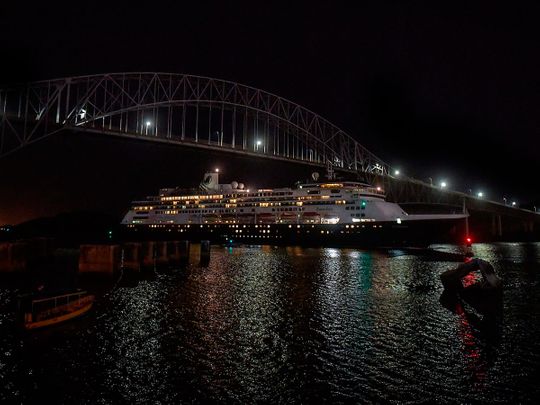
Singapore City: With cruise ships around the world being idled after hundreds of infections occurred during their voyages, they might have found a new purpose in Singapore.
The city-state is studying using cruise ships to temporarily house foreign workers who have recovered from the coronavirus and tested negative, as it tries to limit the spread after cases soared in the last week.
The move to contemplate housing foreign workers in cruise ships comes with a fair bit of irony. The government in March stopped port calls for all cruise vessels, where hundreds of infections had occurred during voyages elsewhere.
The potential measure could complement other interim facilities such as military camps and vacant public housing, the tourism board said in a statement. The move comes as the country grapples with a surge in infections among foreign workers who live in often-cramped dormitories and facilities.
Singapore had its worst day in the outbreak Thursday as it posted 728 new cases of the virus, a single-day record that contributed to a doubling of its infection count over the past week. The majority of cases occurred at migrant dormitories, where more than 200,000 workers live.
Come with the whole works
Cruise ships are being looked at as they have “readily available rooms and en-suite toilets to minimize person-to-person contact,” the tourism board said. The two ships being assessed for this purpose - Genting Cruise Lines’ SuperStar Gemini and SuperStar Aquarius - can hold up to 2,000 foreign workers, and will allow health measures to be implemented more effectively in existing dormitories by lowering the number of workers there.
With about 10 people sharing a single room, according to Singapore charities that support migrant workers, the crowded conditions at dormitories have emerged as one of Singapore’s biggest challenges in its fight to contain the spread of the coronavirus.
Cruise ships
The workers’ current living conditions have drawn comparisons among health experts to challenges on cruise ships, some of which have shown to be hotbeds for the virus during their voyages. Cruise ships have tight quarters and narrow walkways, making it hard to enforce social distancing.
The cruise industry has suspended operations for the moment, with some operators canceling certain voyages until the end of this year. More than 800 cases of COVID-19 infections occurred during outbreaks on three cruise ship voyages, according to a March 27 report by the US Centers for Disease Control & Prevention. Since then, more cruises have reported coronavirus infections among crew and passengers.
One of the first highly-publicized outbreaks occurred on Carnival Corp.’s Diamond Princess, where some 700 passengers and crew became infected - even as 3,700 on board were subjected to a two-week quarantine off of Yokohama, Japan.
The virus was found on surfaces in cabins of infected passengers on the Diamond Princess up to 17 days after the cabins were vacated but before they were disinfected - suggesting that the virus might live longer on ships’ surfaces than what’s been reported in other studies.
Ship Assessment
Genting’s SuperStar Gemini, which arrived April 17 from Hong Kong, is currently berthed at Marina Bay Cruise Centre where it will undergo an assessment to determine its suitability for temporary housing, according to Singapore’s tourism board.
The assessment will consider, among other areas, the ship’s ventilation systems, security protocols and infection control measures, and will only be used to house foreign workers if it passes the assessment, it said. SuperStar Aquarius may be activated for assessment at a later date.
Should the cruise ship proposal by Singapore go ahead, the low-wage workers will be allowed scheduled outdoor time and provided mobile phone connectivity and wireless internet surfing, the tourism board said.








